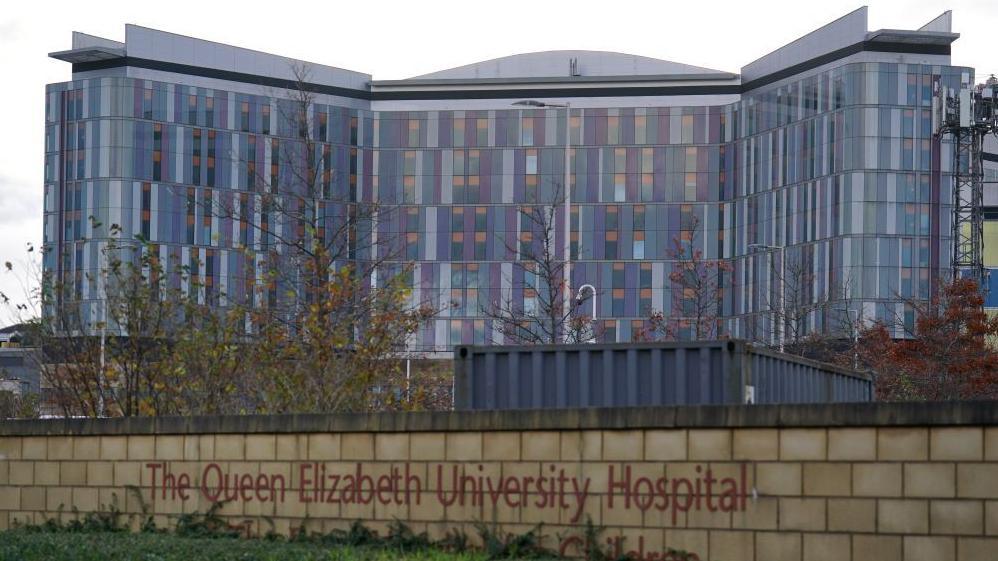Hospital water system filled 'too early', inquiry told

- Published
A hospital water system was filled "too early", increasing the opportunity for contamination, a microbiologist has told the Scottish Hospitals Inquiry.
The inquiry heard that the water system at the Queen Elizabeth University Hospital (QEUH) in Glasgow was filled more than 12 months before it opened to patients.
Dr Tom Makin said he accepted that the water system has to be filled during the construction process to test that it was working properly but that this should be done "as late as possible" and that he was "surprised" it was done so early.
The inquiry is currently investigating the construction of the QEUH campus in Glasgow, which includes the Royal Hospital for Children.
Dr Makin, a microbiologist, runs the Makin and Makin Consultancy which provides water quality advice to companies and healthcare facilities. He previously worked for the NHS between 1968 and 2010.
He was contacted by NHS staff in Glasgow in April 2018 and asked to provide advice after contamination was found in the hospital water supply.
Hospital boss 'dropped the ball' on contamination risk
- Published22 August 2024
Scottish hospitals inquiry: What is being investigated?
- Published19 August
Dr Makin first visited the hospital on 10 May 2018 and said that given the size of the hospital and the fact it was a new build he was not surprised there were issues.
The witness told the inquiry of a report which said that the water system was filled during construction and remained so for more than 12 months before the hospital began receiving patients.
He said: "That's an unusually long time to have a water system filled before it goes into operational use. I was quite surprised.
"As soon as you put water into a system it gives the opportunity for biofilm to develop. You should really only fill a water system as late as you can prior to it being used."
Biofilm is a group of microorganisms, like bacteria, that stick together on a surface.
Biofilms can be a problem in medical settings as they can cause persistent infections that are hard to treat. They can also cause issues in industrial settings, like clogging pipes or contaminating water supplies.
Contamination risk
Dr Makin added that it was normal for water to be put into pipes during construction to check for leaks but added doing it too early could cause "contamination to occur".
He said he considered that filling the system a year prior to patients moving in was "too early".
"And not just for contamination to occur," he added.
"We're not just talking about micro organisms entering the water system and floating around, we're talking about organisms getting into the water system and establishing biofilm and biofilm once it gets established is particularly difficult to remove," he continued.
Dr Makin said that, in his view, a biocide should be put into the system as soon as it is filled with water to reduce the risk of problems.
'Very complex problem'
Graham Maciver, junior counsel to the inquiry, asked whether he gained an understanding of what the underlying causes of the issues at the QEUH actually were.
Dr Makin replied: "As far as I'm concerned, obviously, there was the issue of the size of the system, it was so big, so much more easily contaminated when you've got a big system like that."
He said it was a "very complex problem which involved a lot of issues" and that "some of them were outside the control of people who were then occupying the building to a certain extent because they may have inherited some of the problems".
He also told the inquiry that he did not know whether the water system was flushed or a biocide introduced during the construction process.
Last week, the inquiry heard from the former head of estates for the QUEH who admitted he "dropped the ball" when addressing safety risks at the Queen Elizabeth University campus.
Ian Powrie told the Scottish Hospitals Inquiry it took him three years to read a report that warned the hospital’s water supply was at a high risk of contamination when it opened in 2015.
He said it was not until years later when there was an infection outbreak in the child cancer wards in April 2018 that testing found "systemic"' contamination of the water supply.
The inquiry before Lord Brodie - which was launched in the wake of deaths linked to infections at the hospital - continues.